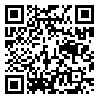Fri, Dec 26, 2025
[Archive]
Volume 5, Issue 3 (Summer 2008 2008)
IJMSE 2008, 5(3): 19-24 |
Back to browse issues page
Download citation:
BibTeX | RIS | EndNote | Medlars | ProCite | Reference Manager | RefWorks
Send citation to:



BibTeX | RIS | EndNote | Medlars | ProCite | Reference Manager | RefWorks
Send citation to:
A. Nemati, K. Pourazarang. EFFECTS OF LANTHANUM DOPING ON THE ELECTRICAL PROPERTIES OF SOL-GEL DERIVED AND MECHANICALLY ACTIVATED Pb1.1- X LaX (Zr0.53Ti0.47) O3, NANO POWDERS. IJMSE 2008; 5 (3) :19-24
URL: http://ijmse.iust.ac.ir/article-1-140-en.html
URL: http://ijmse.iust.ac.ir/article-1-140-en.html
Abstract: (44726 Views)
Abstract: The PZT-based ceramics with a composition of Pb1.1-xLax (Zr0.53Ti0.47)O3, were prepared
by conventional mixed oxide followed by mechanical alloying and sol-gel methods in which x was
chosen in the range of 0.02–0.06. The samples were calcined in the range of 450 °C - 750 °C for
4h. The physical and electrical properties of the samples were determined as a function of the
calcination temperature. The obtained data from two methods were compared with conventional
mixed oxide method. Microstructural and compositional analyses of the samples were carried out
using XRD and SEM. Dielectric properties of the samples were measured with an impedance
analyzer. The ferroelectric properties of the PZT and PLZT samples were measured using the
frequencies applying equipment and d33 tester. The results indicated a complete tetragonal phase
prepared from both methods. It was shown that the addition of La and reduction in calcination
temperature improved both the dielectric and piezoelectric properties. The dielectric constant
tended to increase with doping content, giving the maximum value of about 2000 at 3 mol% La3+.
In addition, the mechanical coupling factor (Qm) of the doped samples showed a significant
decrease. Finally, the value of planar coupling factor (kp) reached the maximum value of 0.47 at 1
mol% La3+.
Type of Study: Research Paper |
Send email to the article author
| Rights and permissions | |
 |
This work is licensed under a Creative Commons Attribution-NonCommercial 4.0 International License. |






